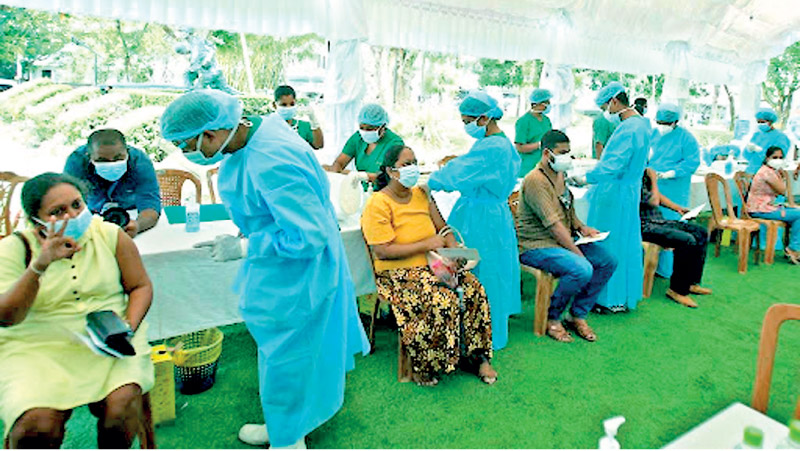Wednesday Feb 18, 2026
Wednesday Feb 18, 2026
Monday, 29 November 2021 00:45 - - {{hitsCtrl.values.hits}}

Health systems must be able to detect emerging viruses and offer rapid and robust responses wherever they are needed to prevent spread both within nations and across national borders
By WHO Director-General’s Special Envoys for COVID-19
Almost two years in, and the COVID inferno still burns. Several countries are witnessing a fifth wave of high transmission. Others are recording their highest daily case numbers since the pandemic began. Low- and middle-income countries – where vaccination rates are often very low – are seeing substantial numbers of deaths.
The trends are seen both in nations with adequate doses of vaccine, as well as in those with very tight supplies. Many of the latter are in Africa, where more than 97% of the population still haven’t been immunised. These countries cannot get the vaccine they need because supply commitments from manufacturers are not coming through as planned. They can get vaccines to their people but simply do not have enough doses to meet the need.
How did the world get here?
Insufficient preparation. Insufficient investment. Insufficient collaboration. Insufficient learning.
Outbreaks usually start without any warning. Preparedness and readiness within countries are essential for rapid responses. These responses must be supported by robust global collaboration that can function even amid inter-governmental tensions. Health systems must be able to detect emerging viruses and offer rapid and robust responses wherever they are needed to prevent spread both within nations and across national borders.
Responses work best if built on collaboration, coordination and solidarity: all are essential when tackling global challenges. The Access to COVID-19 Tools (ACT) Accelerator shows what can be achieved if professionals from different nations are enabled and supported to act together to develop and share vaccines, treatments and diagnostics.
So, what is preventing the authorities in low- and middle-income countries from achieving the target of 40% of their people double-vaccinated by the end of 2021 – and 70% by the middle of 2022? High-income nations are forging ahead with offering booster doses to their people, and ensuring that they have plenty of vaccine stocks in reserve. They also offer donations to poor countries but commitments are generally too haphazard to offer consistent and predictable support for countries in need. Collaboration between nations is also inconsistent and not sustained. As the fires of the pandemic flare up, the quality and predictability of response are hampered by suspicion and competition.
Responses so far are suboptimal and millions of people are feeling so much distress and pain. In every country it is the poorest and most vulnerable people who bear the brunt of suffering related to COVID-19.
We see how vital it is to learn from what has happened in the last two years and, in the months and years to come, to implement actions that are evidence-based and equitable, wherever they are needed.
Now is the time to support the farsighted efforts of many member nations of the World Health Organization (WHO) as they work towards an international legally binding agreement for preparing better responses to disease outbreaks, epidemics and pandemics. To consider the merits of a new agreement for pandemic preparedness and response, these nations have called for a Special Session of the World Health Assembly, starting on 29 November. The WHO Director-General has highlighted that the agreement should set out high-level principles to strengthen solidarity, equity, One Health and health for all.
Such a step is vitally important. The pandemic is raging in many countries and needs concerted attention from decision-makers. Now is the time to hit hard to prevent such an avoidable global tragedy occurring again! There is a growing chorus of support among countries and leaders that a legally-binding agreement is essential, and the sooner the better. We, the WHO Special Envoys for COVID-19, ask leaders to act together, spurred on by the suffering provoked by this pandemic, to prevent a sequel before political attention lapses.
This anticipated international agreement must be principled. It should be based on people having fair access to what they need for their health, for the viability of their economies and for them to realise their human rights.
And a universally-binding agreement that articulates a firmly agreed upon approach to equitable use and distribution of our resources is not only morally correct, it is also the right thing to do from a public health point of view.
As the WHO Special Envoys, we call on national leaders and the WHO to make the agreement happen and to do it effectively, rapidly and on a sound, durable financial footing. This is a once-in-a-generation opportunity to insulate the world from the next inferno of infectious disease and build forward with better mechanisms that protect all future generations.
(WHO Director-General’s Special Envoys for COVID-19 comprise Professor Dr. Maha El Rabbat, former Minister of Health and Population of Egypt and Professor of Public Health; Dr. David Nabarro, former Special Adviser to the United Nations Secretary-General; Dr. John Nkengasong, Director of the African Centres for Disease Control and Prevention; Dr. Mirta Roses, former Director of the WHO Region of the Americas; Dr. Palitha Abeykoon, former Director, Health Systems Development, WHO South-East Asia Regional Office; Professor Samba Sow, Director-General of the Center for Vaccine Development in Mali.)